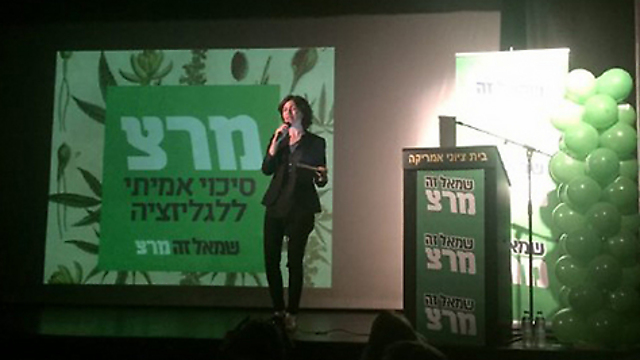To prevent disastrous result on March 17 elections, Meretz MK Tamar Zandberg convenes cadre of experts on medical marijuana, hoping to strengthen her faction’s base.
By Roei Eisenberg
With a low turnout, illustrating the electoral danger that Meretz faces in the upcoming election, the perennial underdog convened Sunday a cadre of experts on medical marijuana to strengthen its base and prevent a disastrous result on March 17 that would leave the left-wing short of its most vocal champions.

Zandberg at Meretz cannabis legalization conference. – Photo: Roei Eisenberg
The activists who gathered at the ZOA House in Tel Aviv did not show a hint of the potential defeat in the elections, and responded with full conviction when confronted with the possibility.
The assembled guests were treated to a sampling of songs by Hadag Nachash – a popular Israeli ensemble known for taking on social issues in their music – as they awaited the introduction of the night’s speakers, led by Meretz MK Tamar Zandberg.
Predictably, both for an Israeli event and a conference pushing for the legalization of cannabis, the eminent experts were nowhere to be seen more than 30 minutes after the scheduled start.
One audience member, an older Meretz activist, admitted he was uneasy about the topic, but that the explanations he had heard in recent months convinced him that he should reexamine his beliefs on the legalization of this particular soft drug.
“I am reassured because Meretz still opposes the legalization of hard substances,” he said.
The central message of the night was simple: A million people are not criminals.
Dror Morag, the director-general of Meretz, took a moment at the start to thank Zandberg for her tireless contributions to an issue that is controversial and problematic for many Israeli politicians.
Research presented by the first expert, JIMS analyst Yarden Gazit, showed the Israeli government spends 690 million shekels a year enforcing the criminalization of cannabis.
Legalization of the drug will result in expected income for the state of some 950 million shekels, he claimed, using a conservative estimate of cannabis consumption – though only 26 percent of Israelis support such policy.
His research showed more than 18,000 criminal cases are opened a year for marijuana-related offenses – some 70%.
Dr. Rick Doblin, MAPS Executive Director at Harvard University, said he was excited to speak at the conference as Meretz’s pro-peace values aligned with his own.

Zandberg speaking at marijuana conference. – Photo: Roei Eisenberg
“I have relatives here from all parts of the political spectrum,” he said before mentioning his family’s strong connection to the Jewish state.
Sue Sisley, a world-renowned expert on the use of medical marijuana in soldiers suffering from PTSD, also mentioned her connection to Israel when she took to the stage, noting that both of her parents were born in Tel Aviv.
Sisley was fired from the University of Arizona for her advocacy of cannabis, and said she was surprised that her Israeli family was also hesitant and unsupportive of her line of research.
“Patients who use medical marijuana are not trying to get intoxicated,” she said, after admitting – to a fit of short laughs – she has never experimented with the drug she advocates.
“The potential benefits clearly outweigh the risks,” she claimed, urging Israelis to “vote yes for a party that supports this platform.”
“Consider the possibility that someone you love may suffer from an illness in the future,” she added.
The quiet crowd was immediately animated by the introduction of MK Zandberg, who took the stage to a round of applause.
“Thank you for coming to the first political convention on the legalization of marijuana in Israel,” she said.
The Meretz MK slammed her rivals for their impotent responses to the legalization of cannabis, mentioning Yesh Atid chief Yair Lapid’s infamous quip in opposition to the policy: “Because it’s illegal.”
She also lashed out at prominent Yisrael Beytenu politician Faina Kirschenbaum who criticized the consumption of cannabis but is currently in the center of a corruption probe.
“Do we want to be a society who chases the weak while letting criminals go?” posed Zandberg.
“I want to tell you about the first time I met marijuana patients who quietly told me they had found only one drug that works in improving their condition,” she recalled.
Zandberg said that Israel has the potential to be at the forefront of medical marijuana exports. “There are high-level delegations who visit to inquire about our pharmaceutical produce,” she said. “We are missing out on billions of dollars.”
Zandberg said that many dismiss the issue of cannabis legalization in Tel Aviv because “it is easy to smoke a joint (there).” But in other parts of the country, marijuana use is not as accepted, she said. “In Jerusalem and the Galilee and Be’er Sheva – scuffed up hair can be enough of a cause for a police search, ending in a harmful criminal record.”
“Meretz is proud to be at the vanguard of this struggle,” she said. “This is like daylight savings policy, which everyone knew needed reform but it was only Meretz who took up the mantle.”
“If you are a leftist, if you support legalization – vote Meretz,” Zandberg urged with her closing remarks.
View original Ynet publication at: http://www.ynetnews.com/articles/0,7340,L-4632281,00.html







 Israeli New Shekel Exchange Rate
Israeli New Shekel Exchange Rate